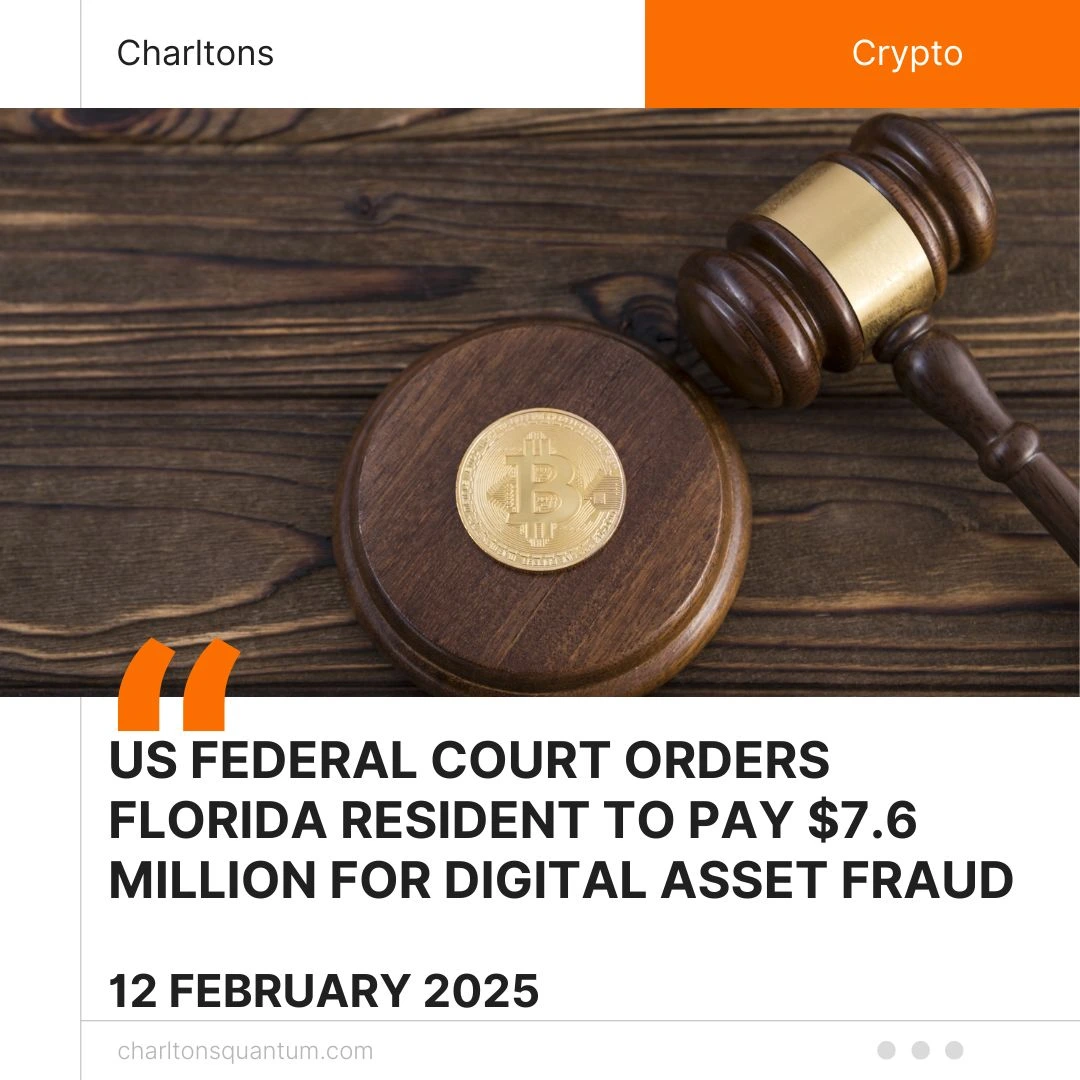
On 10 February 2025, the United States Commodity Futures Trading Commission (US CFTC) announced that the United States District Court for the District of Massachusetts had entered a consent order dated 6 February 2025 against Randall Crater, a resident of Heathrow, Florida, in connection with a fraudulent digital asset scheme. The consent order for permanent injunction and other equitable relief against Randall Crater, requires Crater to pay over $7.6 million in restitution to defrauded victims, with a dollar-for-dollar credit for payments made under a parallel criminal action. The court also permanently enjoined him from trading in US CFTC-regulated markets, engaging in transactions involving commodity interests or digital asset commodities, and registering with the US CFTC. The order resolves the US CFTC’s enforcement action against Crater in relation to his role in My Big Coin, a fraudulent virtual currency scheme that misled investors about the legitimacy, backing, and tradeability of the digital asset.
The United States District Court for the District of Massachusetts found that Randall Crater violated multiple provisions of the United States Commodity Exchange Act (US CEA) and United States CFTC regulations by engaging in fraudulent solicitation, misrepresentation, and misappropriation of investor funds. The US CFTC alleged that Crater’s actions contravened Section 6(c)(1) of the US CEA (7 U.S.C. § 9(1)) and US CFTC Regulation 180.1(a) (17 C.F.R. § 180.1(a)), which prohibit deceptive and manipulative conduct in connection with the sale of commodities, including digital assets. These provisions are designed to ensure market integrity and investor protection by requiring individuals engaged in commodity transactions to act transparently and honestly in their representations to investors. Instead, Crater fraudulently solicited investments by claiming that his digital asset, My Big Coin (MBC), was backed by gold, actively traded on currency exchanges, and held real economic value—all of which were false. He misappropriated customer funds for personal luxuries rather than using them to develop or maintain a functional digital asset market. The violations related to digital assets specifically stem from the misrepresentation of MBC’s value and use, falsely asserting that it was a legitimate commodity-backed digital currency when in reality it was a non-existent asset designed to deceive investors. The US CFTC’s enforcement action sought to hold Crater accountable for his fraudulent conduct and prevent further violations of commodity laws in the digital asset space.
The court’s consent order permanently enjoins Crater from engaging in any trading, solicitation, or commodity-related transactions regulated by the US CFTC. It also bans him from registering with the US CFTC and prohibits him from engaging in any investment activity related to commodity interests or digital assets. The court-appointed the United States National Futures Association as the Monitor to oversee compliance with restitution obligations. While Crater is required to pay full restitution, the US CFTC cautioned that victims may not fully recover their losses, as the ability to repay is contingent on available assets.
In a parallel criminal proceeding under United States v. Randall Crater, No. 1:19-cr-10063-DJC (D. Mass. 2022), Crater was convicted by a jury on 21 July 2022 of wire fraud, unlawful monetary transactions, and operating an unlicensed money-transmitting business. On 31 January 2023, he was sentenced to over eight years in prison and ordered to pay $7.6 million in restitution to defrauded victims. The court also imposed a forfeiture order of $7.6 million, representing the proceeds derived from the violations.
The US CFTC acknowledged the assistance of the United States Attorney’s Office for the District of Massachusetts, the United States Department of Justice Criminal Division’s Fraud Section, and the United States Federal Bureau of Investigation in bringing the case to resolution.
(Source: https://www.cftc.gov/PressRoom/PressReleases/9051-25, https://www.cftc.gov/media/11781/enfrandallcraterconsentorder020625/download)





